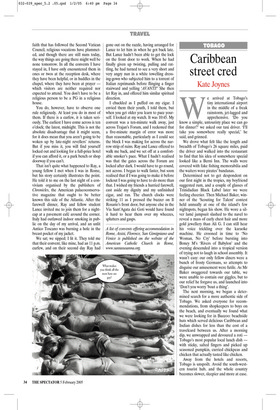Caribbean street cred
Kate Joynes
We arrived at Tobago’s tiny international airport in the middle of a freak rainstorm, jet-lagged and apprehensive. ‘Do you know a simple, untouristy place we can go for dinner?’ we asked our taxi driver. ‘I’ll take you somewhere really special,’ he said, and grinned.
We drove what felt like the length and breadth of Tobago’s 26 square miles, paid the driver and walked into the restaurant to find that his idea of somewhere special looked like a Berni Inn. The walls were covered with fake fishing memorabilia and the waiters wore pirates’ bandanas.
Determined not to get despondent on our first night in the tropics, my boyfriend suggested rum, and a couple of glasses of Trinidadian Black Label later we were feeling cheerier. Then Michael Baker, winner of the ‘Scouting for Talent’ contest held annually at one of the island’s few nightspots, began his show. He wore a silver lamé jumpsuit slashed to the navel to reveal a mass of curly chest hair and more gold jewellery than Ali G. I can still hear his voice trickling over the karaoke machine. He crooned in time to ‘No Woman, No Cry’ before bursting into Boney M’s ‘Rivers of Babylon’ and the evening descended into a tropical version of trying not to laugh in school assembly. It wasn’t easy: our only fellow diners were a bunch of frosty Germans, so attempts to disguise our amusement were futile. As Mr Baker swaggered towards our table, we were unable to contain our giggles, but to our relief he forgave us, and launched into ‘Don’t you worry ’bout a thing’.
The next morning, we began a determined search for a more authentic side of Tobago. We asked everyone for recommendations, from shopkeepers to boys on the beach, and eventually we found what we were looking for in Buccoo: beachside huts which served delicious Caribbean and Indian dishes for less than the cost of a travelcard between us. After a morning dip, we unwrapped and devoured a roti — Tobago’s most popular local lunch dish with sticky, salted fingers and picked up seasoned pumpkin, curried chickpeas and chicken that actually tasted like chicken.
Away from the hotels and resorts, Tobago is unspoilt. Avoid the south-western tourist hub, and the whole country becomes slower, sleepier and more at ease. Tobago has low (albeit rising) crime rates, and so it’s an entirely different experience from travelling in Latin America or even Trinidad. Trinidad, Tobago’s big sister, suffers from a lot of violent crime, but it is safe to walk around Tobago at night as even our hotel’s cautious tour guide acknowledged. We walked from the hotel to Plymouth village. Crickets hidden in the heavy undergrowth provided the soundtrack to the journey, immaculately attired schoolchildren in incongruous tartan uniforms waved at us from their bus, and occasionally a passing car would honk and offer us a lift.
In Plymouth, the general store doubles as a bar and village hall. Flimsy makeshift tables stood out front and a formidable sound system belted out an eclectic mix of Caribbean tunes. A handful of people danced by the roadside while others leaned back against garden walls, sipping a bottle of Stag or Carib beer.
We were the only visitors, but instead of being treated with suspicion we were welcomed and included. Locals told us where to buy street food and we tucked into curried goat and plantain spiced with potent pepper sauce. A few Caribs later we were dancing with the best of them, two gawky white additions to the ad hoc party. Initially we felt like public-school kids crashing an edgy urban party, but we left the crowd with the warm feeling of having made new friends.





















































 Previous page
Previous page